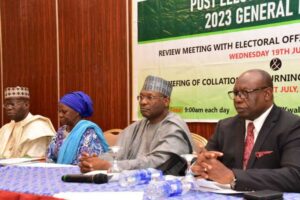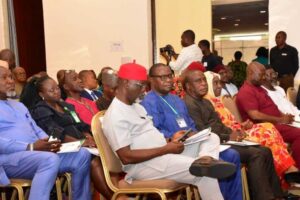On Wednesday in Abuja, the Independent National Electoral Commission (INEC) carried out its examination of the general elections in 2023.
According to News About Nigeria, the review is still in progress and covers all facets of the electoral process, including what happens before, during, and after the polls.
A group of INEC officials, as well as members from civil society organizations and other stakeholders, are conducting the evaluation.
The decision by INEC to conduct a post-election review is consistent with its custom of doing so following each general election. The evaluations are viewed as a chance for INEC to grow from its errors and enhance the electoral process.


On February 25, INEC held elections for the National Assembly and the presidency; on March 18, it held elections for governors and state Houses of Assembly.
The full statement delivered at the meeting by INEC Chairman is provided below:
REMARKS BY THE CHAIRMAN, INDEPENDENT NATIONAL ELECTORAL COMMISSION (INEC), PROF. MAHMOOD YAKUBU, AT THE POST-ELECTION REVIEW MEETING WITH ELECTORAL OFFICERS HELD AT LADI KWALI HALL OF THE ABUJA CONTINENTAL HOTEL ON WEDNESDAY 19TH JULY 2023
National Commissioners
Leaders of the Road and Marine Transport Unions
Cross Section of our Electoral Officers from States of the Federation
Other Senior Officials of the Commission
Members of the INEC Press Corps
Ladies and Gentlemen
1. It is my pleasure to welcome you all to this meeting. Some of you here today may recall that at the meeting with the Resident Electoral Commissioners (RECs) held two weeks ago on Tuesday 4th July 2023, the Commission announced the commencement of the review of the 2023 General Election. This was followed a week later by State level review meetings nationwide involving our regular staff and ad hoc officials. Today, we commence a more focused engagement at the national level with the Commission’s frontline officials, the Electoral Officers (EOs). We also considered it appropriate to interface with transport providers to review logistic arrangements by inviting the leadership of the National Union of Road Transport Workers (NURTW), the National Association of Road Transport Owners (NARTO), and the Maritime Workers Union of Nigeria (MWUN).
2. There is no doubt that the success of any election primarily depends on the ability to deploy personnel and materials to various locations. In Nigeria, this involves the biggest logistic deployment the nation periodically undertakes across vast terrains and often difficult topography. This has been a perennial challenge over time but is now compounded by issues of infrastructure and insecurity. However, the Commission has to deploy personnel and materials not only for Election Day activities but electoral activities in general covering the period before, during, and after the elections. Many of these activities such as the Continuous Registration of Voters (CVR), monitoring of party primaries for the nomination of candidates for the election, and the procurement and deployment of sensitive and non-sensitive materials must be accomplished ahead of the election otherwise critical Election Day processes will be impossible.
3. This meeting, therefore provides an opportunity to interact on a wide range of themes that covering of which ten critical areas are highlighted for discussion:
i. General State of Preparedness for the 2023 General Election;
ii. Voters Registration Process and the associated issues of Adequacy of Timing, Display of Voter Register for Claims and Objections, Clean-up of Voter Register, PVC Collection, etc.;
iii. Recruitment, training, deployment, and remuneration of ad hoc staff, including specific issues of the mode of recruitment, the conduct of training, timing, adequacy, effectiveness, and utility of e-learning training platforms, and strategy for efficient payment of ad hoc staff.
iv. Matters arising from the implementation of the expansion of voter access to Polling Units;
v. Receipt and deployment of election materials;
vi. 5u various portals for the nomination of ad hoc staff, candidates, accreditation of observers, media, polling/collation agents as well as voter registration, accreditation, and result management;
vii. Election security;
viii. Election Day processes concerning:
i. Forward logistics in terms of transportation of personnel and delivery of materials to Registration Area Centres (RACs) and Polling Units (PUs), including specific issues of engagement with transport unions and the implementation of State-level obligations; and
ii. Reverse logistics and movement of personnel and retrieval of field assets.
ix. Inventory of election materials, particularly the status and storage of reusable assets such as ballot boxes, voting cubicles, and electric power generators, etc.; and
x. Physical conditions of storage and other immovable facilities.
4. Similarly, in line with the Commission’s policy, when the review engagements are completed, a comprehensive report will be prepared. I, therefore urge you to lend your wealth of experience to the discussions to identify areas of strengths and weaknesses for immediate improvement in forthcoming elections, especially the three off-cycle Governorship elections in Bayelsa, Imo and Kogi States scheduled to hold on Saturday 11th November 2023.
5. I want to assure Nigerians in the next two weeks, the Commission plans to hold more engagements with internal and external stakeholders, including political parties, civil society organizations, the media, and security agencies.
6. On this note, it is my pleasure to welcome you once again to this meeting.
7. I thank you all and God bless.